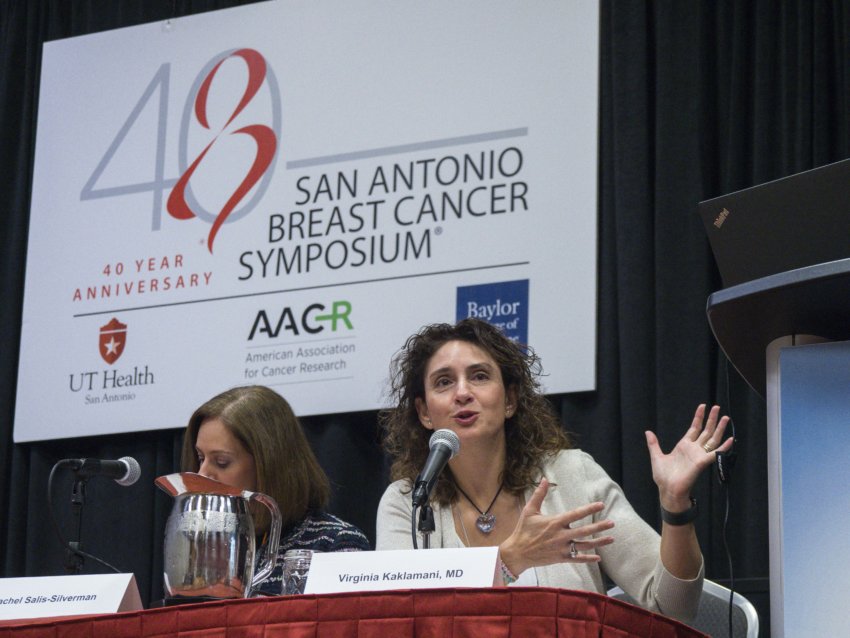SAN ANTONIO (Dec. 3, 2018) ― More than 7,000 physicians and researchers from around the world will converge on the Henry B. Gonzalez Convention Center, 800 E. Market St., Dec. 4-8, to attend the San Antonio Breast Cancer Symposium® (SABCS®).
Founded, owned and operated by UT Health San Antonio, SABCS began in 1977 as a one-day regional conference. Over the past 41 years, the meeting has grown into a five-day international conference with representatives from more than 80 countries. Fifty percent of attendees are from countries outside the U.S.
“SABCS is one of the largest breast cancer conference in the world,” said Virginia Kaklamani, M.D., professor of medicine and leader of the UT Health San Antonio breast cancer program, who serves as one of three co-leaders of the SABCS.
The basic scientists, physicians, clinical investigators and patient advocates who attend provide an estimated economic impact of more than $20 million, according to a 2015 economic study, said Symposium Director Rich Markow from UT Health San Antonio.
Economic benefits aside, said Ruben Mesa, M.D., FACP, director of UT Health San Antonio’s cancer center, “The science presented at the San Antonio Breast Cancer Symposium and the discussions they generate help advance the standard of care for cancer patients around the world.”
UT Health researcher to present updated data on new, first-in-class agent
UT Health San Antonio researchers will be presenting several posters at the meeting. One of them is Ratna Vadlamudi, Ph.D., professor of obstetrics and gynecology, who will present data on a novel, first-in-class agent to treat estrogen receptor (ER)-positive and ER-negative breast cancer.
“Most breast cancers in women require the hormones estrogen or progesterone to grow. To treat hormone-dependent cancers, you must either block the hormone or block the receptor that receives the hormone to prevent the development of cancer. We have been developing a new molecule called ERX-11 that blocks the growth of recurring breast cancer that becomes resistant to other treatments,” he said. Although the research is still in the preclinical stage, Dr. Vadlamudi hopes to move the new agent into clinical trials soon. He and researchers from UT Dallas and UT Southwestern have a joint patent on the new molecule.
“What is discussed at the SABCS truly guides what is studied in the field of breast cancer all over the world,” Dr. Kaklamani said. “The physicians and scientists take what they learn here back to their practices or labs the following Monday morning to improve care for patients.” She describes below two examples of major research discoveries presented at the symposium and where they are today.
Aromatase inhibitors
At the December 2014 SABCS, an international research group presented findings of the Suppression of Ovarian Function Trial (SOFT). The trial evaluated a new approach to preventing recurrence of breast cancer in young women of childbearing age who had early stage hormone-receptive-positive (HER+) breast cancer.
Too much estrogen can cause breast cancer cells to reproduce uncontrollably as cancer cells. The trial evaluated three different ways to suppress estrogen to prevent breast cancer recurrence.
The researchers found that a combination of a chemotherapy drug called tamoxifen plus an aromatase inhibitor named exemestane (brand name Aromasin) was most effective. “Aromatase inhibitors are now the standard-of-care treatment for early stage breast cancer based on large trials presented for the first time at SABCS,” Dr. Kaklamani said.
Genomic test help avoid unnecessary treatment
Dr. Kaklamani said a genomic test called Oncotype DX has been developed to analyze a group of 21 cancer genes. The analysis helps predict how a specific patient’s cancer will behave and respond to treatment. “We can now avoid using chemotherapy for most women with early stage breast cancer based on the genetic makeup of their tumors. These findings were initially discussed at the SABCS,” Dr. Kaklamani said.
In addition to UT Health San Antonio, the two other institutional co-sponsors of the SABCS are Baylor College of Medicine and the American Association of Cancer Research.
# # #
For current news from the UT Health Science Center San Antonio, now called UT Health San Antonio™, please visit our online newsroom, like us on Facebook or follow us on Twitter.
# # #
About the San Antonio Breast Cancer Symposium
Since 1977 the San Antonio Breast Cancer Symposium® (SABCS®) has been the leading scientific conference for basic scientists, physician-scientists, clinical investigators and breast care providers, and advocates seeking an exchange of new information in experimental biology, etiology, prevention, diagnosis, and therapy of premalignant breast disease and breast cancer. Founded, owned and operated by UT Health San Antonio, the symposium has grown to a five-day event attended by an international audience of academic investigators and private physicians from over 80 countries to attain information through abstract presentations, panel discussions, research findings and state-of-the-art educational sessions. UT Health San Antonio, with co-sponsors, Dan L Duncan Comprehensive Cancer Center at Baylor College of Medicine, and the American Association for Cancer Research, supports SABCS, which provides education and accessibility to the latest information regarding the prevention, diagnosis, and treatment of premalignant breast cancer and breast disease.


